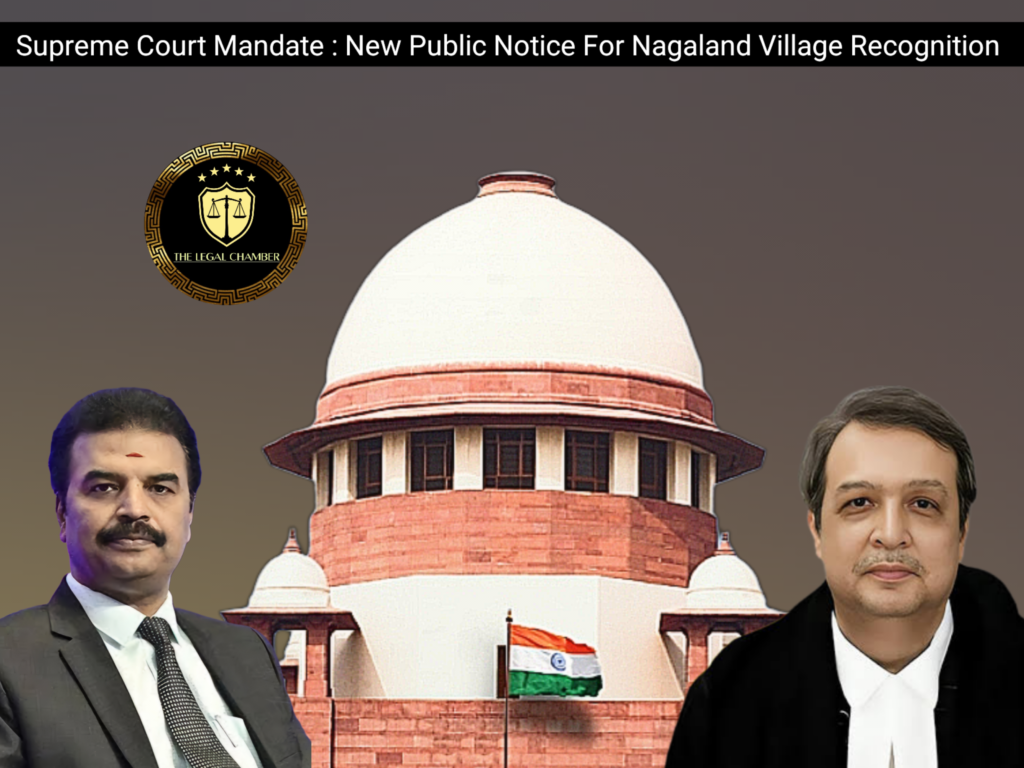
The Supreme Court, exercising judicial review over executive decisions, set aside the High Court’s directive for village recognition in Nagaland. The Court emphasized adherence to customary laws and specific Office Memorandums requiring “No Objection Certificates” from ancestral villages. It remanded the matter for comprehensive consideration of objections, including those from the appellant, affirming that inter-district boundary disputes are irrelevant to village recognition.
Facts Of The Case:
This Supreme Court judgment stems from a dispute concerning the recognition of Kakiho Village in Nagaland. The core of the matter involved the application of existing government Office Memorandums (O.M.’s) dated March 22, 1996, and October 1, 2005, which outline criteria for village recognition, notably requiring a “No Objection Certificate” from parent or ancestral villages. The Old Jalukai Village Council, the appellant, asserted proprietary rights over the land where Kakiho Village is situated and contended that its objections were not duly considered during the recognition process. They were also not a party to the High Court proceedings that led to a directive for the State to recognize Kakiho Village. Furthermore, an inter-district boundary dispute between Peren and Dimapur (now Peren and Chumoukedima) districts was perceived by some as linked to the village recognition, a perception the Supreme Court later clarified as having no bearing on the recognition process itself. The apex court found that the High Court’s decision was made without being aware of the appellant’s case, necessitating a fresh review of the recognition process.
Procedural History:
This case originated from a dispute over the recognition of Kakiho Village in Nagaland. The matter first came before the High Court, which subsequently issued a directive to the State authorities for the recognition of the said village. Notably, the Old Jalukai Village Council, who are the appellants in the Supreme Court, were not arrayed as parties in the High Court proceedings. Aggrieved by the High Court’s decision, the Old Jalukai Village Council subsequently filed a Special Leave Petition before the Supreme Court of India, leading to the present judgment where the apex court reviewed the High Court’s directive and the underlying village recognition process.
READ ALSO : Supreme Court : Sale Deeds Executed After Property Power of Attorney Revoked Are Invalid
Court Observation:
The Supreme Court observed that the High Court’s decision, particularly its remarks on compliance with relevant Office Memorandums (O.M.’s) concerning village recognition, was flawed because the High Court was unaware of the appellant’s (Old Jalukai Village Council) case and their objections. The Court noted that the prescribed procedures for recognition, as per the O.M.’s, were not fully adhered to. Crucially, the Supreme Court clarified that the ongoing inter-district boundary dispute had no bearing or nexus with the issue of recognizing the respondent village. Consequently, the Court directed the State authorities to re-issue a public notice, thoroughly consider all objections, including those from the appellant, and finalize the recognition process within a strict six-month timeline.
Final Decision & Judgement:
The Supreme Court, in its final decision, set aside the High Court’s observations concerning compliance with the Office Memorandums dated March 22, 1996, and October 1, 2005, primarily because the High Court was not apprised of the appellant’s case. Consequently, the apex court directed the State authorities to re-issue a public notice for the recognition of Kakiho Village. This process mandates the exhaustive consideration of all objections, including those raised by the Old Jalukai Village Council. The State is allotted a strict period of six months to complete this entire process and make a conclusive decision regarding the village’s recognition, with strict adherence to this timeline being emphasized. The matter remains part-heard for further review by the same Bench after six months.
Case Details:
Case Title: Old Jalukai Village Council Versus Kakiho Village & Ors. Civil Appeal No.:(Arising out of S.L.P. (Civil) No. 9897 of 2016) Date of Judgment: May 23 , 2025 Judges/Justice Name: Justice J.B. Pardiwala and Justice R. Mahadevan
Download The Judgement Here